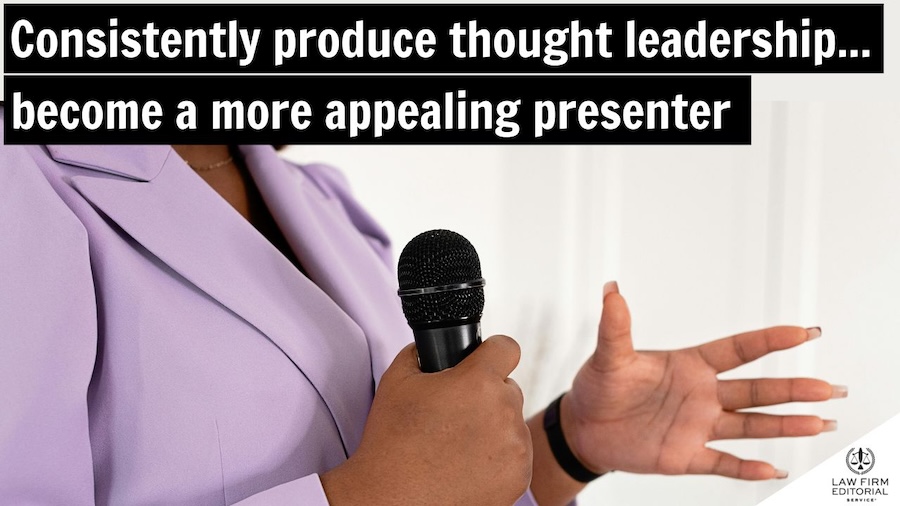Regularly producing thought leadership content can help you become a better, more appealing presenter in several ways, including by building an audience and improving how you communicate your ideas.
Creating content and speaking at events are the two main thought leadership paths.
But did you know there’s an interesting link between the two?
You can become a more appealing and sought-after speaker by regularly producing thought leadership content.
There are five reasons why.
You build a platform for getting noticed by event organizers
This is foundational, but that doesn’t make it any less true: Your consistent production of thought leadership content is how you get noticed by event organizers.
If you’re not producing content, no one has a clue about what you know, what your opinions are, and how an audience could benefit from you presenting to them.
Unless you had a close personal or professional relationship with an organizer, or they had some other way to learn this information, your thought leadership is the only way event organizers become aware of the substance you have to offer their audiences/attendees.
You build an online audience, which can lead to an in-person audience
When you consistently produce thought leadership that people want to read, they follow you on social media and subscribe to your YouTube channel, your email newsletter and/or your other offerings. In other words, they do what they have to do to make sure they receive your content. In the process, you’ll begin to see your online audience form.
Those same people would likely watch you present at an event if they had the opportunity to do so. Event organizers know this. They see—or you tell them about—your email subscribers or LinkedIn followers and they think, “This person is well-known and has a following. People will want to hear what they have to say. We should put them on our stage.”
You get really good at saying what you’re thinking
When you produce thought leadership, you’re forced to refine your thoughts and distill them into paragraphs, sentences, and words that convey those thoughts in a way that people will understand.
When you regularly produce thought leadership, you get used to this process, which should make you pretty darn good at it. You get comfortable with—and, again, pretty darn good at—turning your thoughts about complex issues you encounter when serving your clients into plain English your online audience can digest.
This will make you a better presenter because you’ll be able to communicate clearly to your audience since it will be second nature to you. They won’t have a problem understanding what you’re saying, so your presentations will resonate more with them, and they’ll feel like they received value from attending them.
You have a volunteer focus group to test ideas on and to receive feedback from
When you regularly produce thought leadership content, you’re going to put a lot of content out into the world. Knowing that you’ll be doing so allows you to test ideas and receive feedback on them.
Perhaps you decide to test expanding the subject matter you cover, providing more subjective opinions in your thought leadership, or tinkering with your style, such as including pop culture references in your thought leadership.
Whether that feedback is in the form of comments on social media or replies to your email newsletter, I’m willing to bet that you’ll get a sense from your audience whether they like what you’re testing.
Plus, even if you don’t do much testing, you still might receive feedback that helps you create content that better resonates with your audience.
You audience will tell you what they want to hear more about. They’ll tell you what they think is too abstract or too far on the bleeding edge. They’ll tell you what they wish you’d talk less about.
When you get feedback from your digital audience on your thought leadership content, you can mold your presentations accordingly. This improves the quality of your presentations because you’ll have had the opportunity to fine tune them so they provide the substance your audience wants to hear.
You’ll be able to focus on HOW you present instead of WHAT to present
Finally, taking all this together, consistent thought leadership production helps you more efficiently create your presentations.
Your presentations will almost certainly include at least some thoughts you’ve shared before in your thought leadership content. Thanks to the process of creating that content, your thoughts have been refined. They’ve also been tested. And, if you’ve received feedback on your thoughts, they’ve been tweaked to resonate optimally with your audience.
So, when it’s time to create a presentation for a speaking engagement, you can spend less time creating it because you already know, for the most part, what you’re going to say. Instead, you can focus on how you would give the presentation, including customizing it for the particular audience you’ll be in front of.
Craft thought leadership today, present like a champ tomorrow
Consistently producing thought leadership content is an intellectual audition for future speaking engagements.
By consistently creating thought leadership content, you’re building an audience. You’re also getting better at distilling your thoughts and ideas into content that your audience wants to hear and consume. In addition, you’re testing ideas and getting feedback on them to make them better. And, you’re more efficiently creating presentations, which allows you to focus more on how you present instead of what to present.
When you regularly put in the work to create thought leadership, you’ll give yourself an unfair advantage when you step on stage to present.
Thinking about bringing on an outside writer to help your law firm strategize and create compelling thought-leadership marketing and business development content? Click here to schedule a 30-minute Content Strategy Audit to learn if collaborating with an outside writer is the right move for you and your firm.

